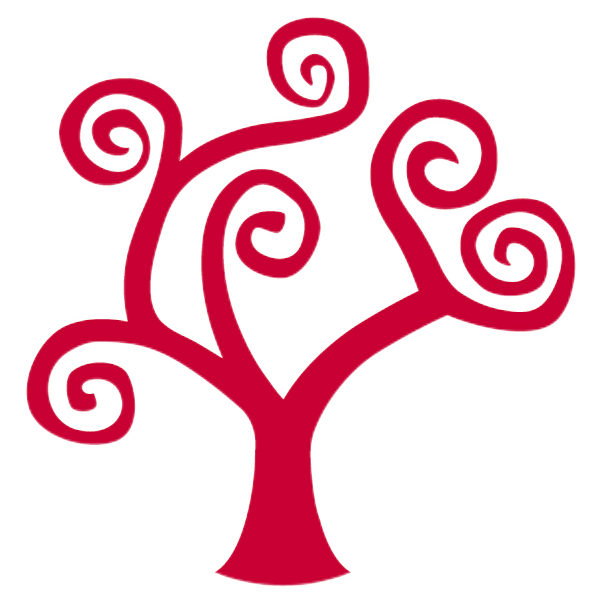The organisation believes that young people with lived experience are best placed to support other young people experiencing mental health and life challenges. Youth Insearch aims to create safe spaces within which young people support each other to heal from trauma, make meaningful peer connections, improve mental wellbeing and overcome life challenges. Delivered through weekend workshops, support groups, peer support and leadership, and individual care, Youth Insearch provides a comprehensive early intervention program of counselling, support, mentoring, and empowerment for at-risk young people aged 12-25.
We exist to create a safe place for young people to heal from trauma. Our aim is to see young people heal and thrive.
– Stephen Lewin, CEO
Originating in northwest Sydney in 1985, Youth Insearch’s programs aimed to reach more at-risk youth than was possible via individual counselling. In just two years program outcomes resulted in the closure of over half the Riverstone Police Station operations as youth crime declined. A review of Youth Insearch’s program commissioned by the NSW State Government in 2003 found positive outcomes across multiple behaviour and well-being measures, including significantly less interactions with justice agencies, higher self-esteem, improved relationships, reduced suicidal thoughts and attempts, and reduced alcohol and drug use, and that the program had a sustained positive impact on these issues over time. In its 2022 Annual Report, Youth Insearch reported 91% of its young people who felt suicidal prior to program participation no longer felt suicidal afterwards.
Along with a trauma-informed approach to the delivery of community based mental health services, Youth Insearch offers young people leadership training and employment opportunities. Through weekend workshops, weekly support groups and individual support, it provides a place for young people to form meaningful and lasting peer connections, experience a safe space to talk about the issues in their life, and receive support from trained youth leaders, peer workers and social workers. Youth leaders are past participants in the program and are positive and real examples to the young participants of what is possible despite a negative background. The wrap-around support and advocacy provided by Youth Insearch enables young people to break negative cycles and create lasting change in communities.
A core element of Youth Insearch’s success is its lived-experience peer workers and youth leaders who work within local communities. Perhaps the most prominent example of this is Youth Insearch CEO Stephen Lewin, who was himself a program participant.
“If it wasn’t for Youth Insearch I could have ended up in jail or dead… 80% of young people that come through the Youth Insearch program make a significant positive change in their lives that’s usually permanent and long lasting, and I’m not saying this just as a CEO, I’m saying that as someone who’s experienced it firsthand and it changed my life.”

Stephen joined the Youth Insearch program in Wagga Wagga after a period of homelessness and an arrest and described it as “the first time [he] actually felt connected with people”. The support he found in the program inspired Stephen to join the Youth Insearch Leadership Program, which he described as “life changing”:
“The Youth Insearch Leadership Program was probably the most life changing program that I’ve participated in – and the opportunities that were given to us as trainee leaders, the experiences were just mind-blowing. I spoke at the United Nations assembly event in Sydney as an 18-year-old. I ended up doing the Kokoda trail.”
Stephen turned his experience with Youth Insearch into a career in which he has consistently walked alongside society’s most vulnerable people. He joined Youth Insearch as General Manager in 2014 and was appointed CEO in 2019.
Hear more of Stephen’s story here:
Cover photo: Participants at a Weekend Workshop in Bundaberg. All photos courtesy of Youth Insearch.
Youth Insearch is supported through the Resilience stream.
It's an honour to feature in this new publication from Philanthropy Australia highlighting our new partnership with the Tim Fairfax Family Foundation and the journey to build this connection. Non-government partnerships such as this are vital for organisations like MusicNT to continue delivering outcomes across the Territory.
– Mark Smith, Executive Director, MusicNT
MusicNT supports 3,500 members with programs, events, workshops, mentoring, recording opportunities and industry contacts. The organisation has received a three-year operational grant from the Tim Fairfax Family Foundation (TFFF), which Mark said is a gamechanger. “I wish more funders would do it. It’s the missing link,” he said. “It’s given us validation as an organisation, protection from the perils of the live event industry and increasingly fraught government funding model, and freedom to grow.”
The TFFF favours multi-year operating support, in recognition that this is the greatest need for many for-purpose organisations. “That means,” said TFFF CEO Neal Harvey, “finding good people doing good work, and resourcing them to get on with it.
“Mark is absolutely one of those people. It’s been incredible to watch that organisation’s growth in his time. Mark is incredibly well connected across northern Australia, understands community needs and is trusted by the communities, which make MusicNT an ideal partner for TFFF.
“There’s strong evidence that arts and culture are key drivers of social cohesion and wellbeing. But touring and freight is expensive, insurances are needed – all these challenges make it difficult for metro arts organisations to get out to the regions. Tim and Gina are interested in supporting those organisations in the regions already doing the great work.
“If Australia is to become the cultural powerhouse we want to be, we want our art and our artists, particularly First Nations artists, to be celebrated and loved. That’s going to require funding and support. It’s very difficult for future generations to become what they can’t see. MusicNT provides mission-critical leadership and opportunity for Territory communities.”
Read the full publicationhere. MusicNT story pages 46-49.
Cover photo: MusicNT's Bush Bands Bash. Photo by Jeff Tan.
MusicNT is supported through the Resilience stream. Philanthropy Australia is supported through the Leadership stream.
Based in Cairns, with community ties to the surrounding regions extending north to the Cape and Torres Strait, and south to the Townsville region, DIYDG is dedicated to empowering Aboriginal and Torres Strait Islander youth through programs that focus on leadership, culture, and community engagement, and provides a platform for young people to co-design and lead their own projects.
DIYDG was created to support families experiencing intergenerational and persistent trauma. The founding members were motivated by their responsibility to break the cycles of disadvantage and to empower peers, family, and community to develop and realise a different future.
DIYDG acknowledges that its community is diverse, and extends its support to include and empower young people and communities of all nations:
“We have a deep respect and connection to each other which exists beyond bloodlines.”

DIYDG believes that every young person has the power to create positive change in the world, and deserves equal access to opportunities to do so. It aims to provide a safe and supportive space where young people can challenge themselves to grow, to develop resilience and leadership skills, and achieve their goals. DIYDG delivers its service offerings through three streams:
DIYDG delivers 14 core service offerings through these streams, aimed at fostering a strong sense of identity and purpose among young people. The organisation aims to both provide culturally safe processes within its own programs, and to facilitate access to other appropriate programs where possible, and is focused on meeting young people where they are and advocating for them at all levels – understanding both the big picture and local challenges that young people face.
Programs under DIYDG’s banner include the Pamle Pamle Youth & Family Support Service (PPY&FSS), which provides a diverse range of support services to young people and their family, offering holistic responses rooted in Aboriginal & Torres Strait Islander practices, protocols, and connections. Services include crisis support, outreach, family communities, case management, and diversion activities.
The Good Vibrations program aims to strengthen the well-being of young people, with weekly gatherings providing a safe environment for young people to explore themselves, build positive peer connections, develop support structures, and have a place to belong. DIDYG also hold an annual 3-day Wellbeing Camp, on which young people are encouraged to build and facilitate their own workshops and activities, make positive peer connections, build self-awareness and confidence, and share knowledge and stories.

The Lift Leadership program seeks to build leadership potential in young people and is based around the organisation’s key principles: inspire, equip and empower. DIYDG seeks to empower young people to recognise that their problems and challenges are not their identity, and works closely with each individual to equip them with the skills and opportunities to grow and give back to community, and cultivate their voice, identity, and leadership skills for impactful action, fostering collective change and social justice.

Since 2019 DIYDG has been a passionate Advocate of the Uluru Statement from the Heart. In 2022, DIYDG led a grassroots campaign advocating for the ‘Yes’ vote in the 2023 Voice referendum, embarking on a cross-country road trip to gather support and commemorate Vincent Lingiari’s historic 1966 civil rights victory at the annual Freedom Day Festival in Gurindji. The trip was captured in the documentary Voice, co-directed by DIYDG Co-Founder Semara Jose and scheduled to premiere at the Melbourne International Film Festival in August.
Voice will screen at the Melbourne International Film Festival on 21 and 23 August. More details available here.
The 2024 DIYDG Wellbeing Camp will be held from 6 – 8 September. More details available here.



Cover photo: The Lift Leadership Team at St Teresa's College, Abergowrie, for Reconciliation Week 2023. All photos courtesy of DIYDG.
Deadly Inspiring Youth Doing Good is supported through the Resilience funding stream.
The visit coincided with the 2024 Isolated Children’s Parents’ Association (ICPA) Qld State Conference, which was attended by TFFF Senior Program Manager Katie Norman and provided an occasion to learn from rural families, engage with the Department of Education and meet familiar and new child-focused partners.
The first day of the trip began driving out to Idalia on a beautiful North Queensland winter morning to view the new AEIOU Townsville premises, currently under construction. Here, we were joined by Alan Smith (AEIOU CEO), Russell Fryer (Hutchies Managing Director), Mitch Grimmer (Hutchies Team Leader), Schahana Clark (AEIOU Senior Service Delivery Manager), Emma Newham (AEIOU Townsville Centre Manager), and site manager Mark Taylor.

TFFF approved funding to support the construction of the new purpose-built centre in August 2023, and has previously provided support for AEIOU’s regional Autism Early Intervention program. Delivered in partnership with Hutchinson Builders, the centre was designed as a state-of-the-art facility with three classrooms, a motor skills therapy room, telehealth rooms, a community meeting and training space, research rooms and external learning environments and playgrounds. The thought put into every aspect of the build, from accessibility to noise dampening, was incredible – it was clear both staff and children will benefit greatly from the new centre.

Following the site tour, we met Kate O’Hara (Director) and Daniel Qualischefski (Gallery Manager and Curator) for lunch near Umbrella Studio. Umbrella Studio is a gallery and studio space which delivers an annual program of onsite and touring exhibitions, public programs, arts residencies, studio access, and professional development programs, along with TFFF-supported biennial arts festival, Pop Up North Queensland (PUNQ). After lunch, Kate and Daniel gave a tour of the studio, where exhibitions Pressing Topics by The Ironing Maidens and An Unnatural Historyby Sarah Treadwell were on display, and introduced the Umbrella team – Erin Ricardo (Arts Programs Manager), Rikaela Rusch (Marketing and Communications Manager), Sabrina Toby (PUNQ Creative Producer), and Amanda Galea (Arts and Marketing Administrator).
Heading downstairs to the studio space, we met a community artist in the process of utilising the equipment to create intaglio prints using recycled tetra-pack containers. Umbrella’s vast storage room was a maze of interesting and unusual artistic equipment and supplies, including a vintage loom, lithographic stones so heavy they required a pallet jack to move, and the only publicly available darkroom north of Brisbane.

Returning to our hotel, we met with Jacinta Perry (Thriving Queensland Kids Partnership Country Qld Lead). The Thriving Queensland Kids Partnership (TQKP) is a cross-sector coalition of not-for-profit, philanthropic, tertiary, and government bodies all committed to improving health, education and family services systems that shape young lives. With TFFF’s support, TQKP delivers the Thriving Country Queensland Kids Collaborative, designed to support leaders, organisations and practitioners delivering child, youth and family health, development and wellbeing services and initiatives in rural, regional and remote Queensland.
The day concluded with dinner with Dancenorth, attended by Hillary Coyne (Executive Director & Co-CEO), Kyle Page (Artistic Director & Co-CEO), Eloise Grace (Company Producer), and Judith McLean (Chair), which provided a reflective end to a productive day. Dancenorth is one of Australia’s leading contemporary dance companies. Alongside its professional ensemble, touring productions and artist development and leadership initiatives, Dancenorth delivers the TFFF-supported Community Experience Program.

Day Two began with a visit to Seed Foundation, where we shared morning tea with Brett Fragiacomo (Executive Officer), Rick Phineasa (Operational Manager, Townsville), and De’arne French (Administration Manager, Townsville) and looked in on a cohort of Deadly Start students undergoing their Health and Community Services Cert II training. Seed Foundation aims to grow the potential of Australia’s First Peoples by inspiring and promoting self-determination through education, health and employment, and provides holistic support services to improve health, wellbeing and employment outcomes. Its TFFF-supported First Peoples Health Program provides upper secondary and Year 13 students with health literacy education, qualifications, career opportunities, higher educational pathways, and support to navigate and achieve these.
Next, we stopped at the Isolated Children’s Parents’ Association Queensland State Conference held at The Cathedral School, where we were warmly welcomed by Qld State Council President Wendy Henning. The ICPA strives for equity of access to education for all students who live in rural and remote Queensland. Its policies are formed through motions brought to the state conference each year by branches from across the state. The organisation also provides an opportunity for many departmental representatives, Members of Parliament, Senators and other stakeholders to hear issues and opportunities from those directly experiencing them at its conference.

Ningana Trust has supported ICPA Qld since 2011, enabling State Council Members to attend each year’s conference, participate in delegations with state government and peak body representatives, and advocate for rural and remote students’ educational needs. After a brief moment to mingle and explore the extremely well attended conference, Wendy gave the 2024 President’s Welcome, sharing the numerous initiatives ICPA Qld has been involved with over the past year. After the initial speeches, most of the TFFF group departed back to Brisbane, leaving Katie to attend the full conference over the next two days.

Umbrella Studio, Dancenorth, and Seed Foundation are supported through the Resilience stream. AEIOU Townsville and Thriving Queensland Kids Partnership are supported through the Futureproof stream. ICPA Qld is supported by Ningana Trust.
Established by the Queensland Government in 2009, CIAF transitioned to an independent not-for-profit entity in 2013, and now is governed by majority First Nations leaders. The Fair exists to provide a platform for cultural exchange, collaboration, and economic opportunity for Queensland First Nations artists and Art Centres. CIAF recently announced the appointment of its new CEO, Dennis Stokes, who brings two decades of experience in the arts and media sector and a deep commitment to empowering First Nations voices and self-determination in the arts to the role.
CIAF’s centerpiece is a multi-day art fair, held annually in July at the Cairns Convention Centre and satellite venues within Cairns. Extending beyond a typical marketplace and exhibition showcase, CIAF includes traditional and contemporary live performance: music, song and dance; theatre and fashion; workshops and informative talks. Audiences are treated to programmed conversations, workshops, demonstrations, and experiences designed to share Aboriginal and Torres Strait Islander knowledge and culture in an immersive and exciting experience. The Fair is a celebratory event that highlights the importance of culture to the Queensland community, and holds a stand-alone position in the Australian arts landscape as the only event of its type to feature a wide cross section of Queensland Aboriginal and Torres Strait Islander arts.

CIAF’s diverse programming offers a range of free and ticketed events, exhibitions, and performances each year. Performances in music, dance, theatre, fashion and more have seen the number of shows and performances increasing each year and frequently selling out. The Fashion Performance is a stand-out event each year - its unique blend of runway, choreography and song distinguish it from other national Indigenous fashion events, and all three shows sold out in 2023.
CIAF’s 2024 program will celebrate the organisation’s evolution and growth over the past 15 years, featuring hundreds of First Nations artists, performers, fashion designers, and creatives. CIAF’s artistic director, Francoise Lane, said CIAF’s anniversary season is a testament to Queensland’s thriving First Nations arts and culture industry and its place on the world stage.
“From its humble beginnings as an Art Fair, CIAF has evolved into a multifaceted celebration of Queensland Aboriginal and Torres Strait Islander arts, culture, and fashion, featuring artists, performers, and creatives from the Torres Strait, Cape York, and Gulf communities in the north out to western communities and down to the southeast corner.”

CIAF 2024 will be held over four action-packed days, from Thursday 25 July to Sunday 28 July. While CIAF’s event program is predominantly free and for all ages to enjoy, ticketed events include program favourites: the Opening Night Party at Cairns Convention Centre, the two-day Symposium and cultural think tank at Bulmba-ja Arts Centre, highly anticipated ‘Light the Fire’ fashion performances at the Tanks Arts Centre, as well as live music performance, ‘No Shame in My Game’ from First Nations rapper and musician Barkaa, supported by Simone Stacey and held at the Tanks Arts Centre.
CIAF 2024’s theme, ‘Country Speaking’ connects all aspects of the program, providing an opportunity for artists to explore their spiritual, physical, emotional, and mental relationship to Country, a strong First Nations concept embodying 65,000 years of deep connection to the land, waters, skies, and seas.
CIAF will present two satellite events ahead of the Fair, along with a signature 15th anniversary exhibition, ‘Not Selling Cakes’, paying homage to the artists who have contributed to CIAF and the Queensland Indigenous art movement since its inception in 2009.
The second annual Urban BLAKtivation, a family friendly, accessible arts and cultural event with Indigenous dance performances, digital art projections, sculptural art installations, story tellers, and poets will be held in the CBD on Saturday 13 July. It will be followed by CIAF partner Cairns Regional Council event Out on the Lawn, featuring live music from First Nations musicians Kee’ahn, Yirghilya, and Broden Tyrrell at the Cairns Court House lawns.

In addition to the art fair event, CIAF runs several programs designed to support First Nations artists with the development of their career. The CIAF Collectors and Curators program facilitates meetings with artists, leading to acquisitions for private and public collections worldwide, and has seen increasing success each year. Collectors, curators, and gallery representatives are invited to exclusive CIAF events and exhibitions designed to create opportunities for dialogue between artists and program members. The program has resulted in significant success for CIAF in creating opportunities for artists, as well as significant sales to major cultural institutions across Australia, elevating the profiles of both Queensland Aboriginal and Torres Strait Islander artists, and the event itself.
CIAF visited my studio in early 2022 and invited me to participate in that year’s Fashion Performance. The encouragement alone gave me the confidence to work on my ‘Tawalpin-String Making’ collection and then to again bring my 2023 collection ‘dilly bag and mat making’. This exposure and experience quickly led to work with Mob in Fashion, La Boite Theatre, and designing
- Delvene Cockatoo-Collins, First nations artist and designer.
garments for the 2023 Oscars and Logies. I’m forever grateful to CIAF.
The CIAF Indigenous Art Awards were created in 2017 to provide an opportunity for artists to increase their profile in the pursuit of innovation and excellence. As a showcase of Queensland Aboriginal and Torres Strait Islander art, the Art Awards have been successful in driving the quality of exhibited work and elevating the excellence of Indigenous artists.
CIAF plays a critical role in strengthening Queensland’s Aboriginal and Torres Strait Islander culture by providing artists the opportunity to share stories, collaborate and celebrate their connection to Culture and Country. The Fair also provides an important interface for the non-Indigenous community to experience Aboriginal and Torres Strait culture and purchase artwork in an ethically run marketplace. The Cairns Indigenous Art Fair is a new TFFF partner and is supported through the Resilience stream, which provides multi-year general operational support funding. The TFFF recognises the value of providing support to strengthen CIAF’s operational capacity and aims to empower CIAF, and organisations like it, to focus on its strategic objectives and effectively realise its goals. CIAF will utilise TFFF funds to expand its Fashion Performance event and fulfil its vision of delivering a nationally recognised First Nations fashion show showcasing excellence in fashion and textile design.





Cover photo: CIAF 2023 Opening Night. All photos courtesy of Cairns Indigenous Art Fair.
The Cairns Indigenous Art Fair is supported through the Resilience stream.
Brother to Another’s focus centres on keeping young people out of the juvenile justice system in the Northern Territory, while guiding and empowering First Nations young people, families, and communities to heal and realise their full potential. Brother to Another works as a change maker in the community, strategizing for systems redevelopment and change.
First Nations children and adolescents represent over 95% of the youth detention population and 80% of children taken into the child protection system on any given day in the Northern Territory. Despite this severe over-representation of First Nations youth and families, there are few First Nations-led, local services in the Darwin region. Focused on keeping young people out of detention, Brother to Another addresses both the practical needs and the emotional, mental, and social well-being of young men between eight and twenty-four years old, and provides mentoring, counselling, job training and educational re-engagement opportunities.
Brother to Another began as a volunteer program in Don Dale Youth Detention Centre in 2019, with youth-led activities guided by Founder and CEO Jye Cardona. During these sessions, the young people in Don Dale expressed their frustrations that services led by First Nations men were not available to them. Brother to Another was formed to support the young men in Don Dale who were disconnected from their families and culture. Many of these young men also lack access to education and health services and often are experiencing untreated neurodivergence.

As part of its focus on strong, genuine relationships, Brother to Another recognises the power of lived experience. Its team of four, all First Nations men, are each able to share their knowledge and experiences of life as First Nations people, their places in society, and their knowledge of the systems which disproportionately affect the First Nations youth and families Brother to Another supports.
Named by the young people in B Block at Don Dale, Brother to Another has developed its suite of programs and services in collaboration with the young people and families it serves. Since its inception, the First Nations young men and families experiencing the Northern Territory youth detention system have shaped Brother to Another into a case management, systems change, and mentoring service that is First Nations led and engages in strength, opportunity, and culture.

Brother to Another’s services and programs are designed to support the social, emotional, and cultural wellbeing of the young people and families they connect with. Unlike traditional case management, Brother to Another provides on-the-ground mentoring, after-hours engagement, educational classes, cultural immersion days, and a well-being hub that not only youth but families attend. This well-being hub offers a sensory room, art supplies, yarning circles, a gym, native gardening, a shed for work experience, a computer for life admin and employment support, but perhaps most importantly a place for youth to safely connect with their peers, families, and the community.
Brother to Another works to support the entire family unit, strategically positioning young people and families to have improved access to social activities, appointments, healthcare, education, and employment opportunities. It engages with young people and families in various settings in the community – within watch houses and youth detention, at home, and in community and education settings. It aims to identify and address gaps in current service delivery and improve the effectiveness of support in the sector, such as providing additional education support for young people who are ostracised from mainstream schooling due to their involvement with youth detention, and actively engaging with schools and community organisations to create an ecosystem of support.
Supporting, advocating for, and empowering young people and their families to have a voice and decision-making capability is at the forefront of everything Brother to Another does. It is committed to meeting young people and families where they are and providing them with responsive and culturally appropriate support to build life skills, conduct work experience, learn self-regulation skills, engage in positive peer engagement, and reconnect with family.
Brother to Another understands the complex needs and circumstances of First Nations youth and their families who are at risk of or engaged with the Northern Territory juvenile justice system and is increasingly realising its role in creating systems change. Brother to Another is a new TFFF partner and is supported through the Resilience stream, which provides multi-year general operational support funding. The TFFF recognises the value of providing support to strengthen Brother to Another’s operational capacity and aims to empower Brother to Another, and organisations like it, to focus on its strategic objectives and effectively realise its goals.



Cover photo: Brother to Another On Country day. All photos courtesy of Brother to Another.
Brother to Another is supported through the Resilience stream.
Brown’s Mart is central to the Top End's live performance ecosystem, connecting artists living and working in the Territory with national opportunities, and is the leading developer, producer, and presenter of new performance works from Territory artists. Year-round, its performance spaces hold events from theatre productions and live music performances to much-loved annual festivals and community events.
Brown’s Mart’s range of programs and partnerships operate across four distinct program streams: Performance, New Work, Arts & Community, and Hires. Its 2024 Performance program will present unique experiences to its audience every two weeks, with a new model that aims to deliver smaller works, more often. Events cover the full span of performance: large scale song and movement productions, like the World Premiere of Song Spirals, co-presented with Darwin Festival in August, to a series of performed playreadings, one-time-only intimate concerts, local musicians performing live every Friday in the Brown’s Mart Courtyard, self-directed performance experiments, and sponsored opportunities for local collectives to perform in the Brown’s Mart Theatre. With more events to be announced throughout the year, the 2024 program promises “moments to connect, recharge and come together in intimate spaces and joyous celebrations.”

One of Brown’s Mart’s defining features is its commitment to fostering emerging talent and supporting the careers of local artists. Through a range of programs, residencies, workshops, and initiatives, Brown’s Mart provides invaluable opportunities for artists to hone their craft, collaborate with peers, and engage with the community. Its New Work program stream includes residency and mentorship programs, an experimental performance program, and flagship initiative BUILD UP, which offers funding, office and rehearsal space, mentoring and advocacy to support the development of performance work across a range of artforms, artists, and cultural practices. Several new works developed through the program have had their premieres programmed as part of Darwin Festival, receiving wide audience viewership and acclaim.
Brown’s Mart is committed to providing a supportive home for artists and the broader community, promoting and advocating for Territory artists and working with them to offer greater access and deeper engagement wherever it can. Reflecting this, Brown’s Mart’s team includes three Artistic Associates, Cj Fraser-Bell, James Mangohig, and Nadine Birrimilunngga Lee, all multi-disciplinary artists living and working in the Top End. Nadine, along with Rachael Chisholm, Rob Collins, and Rosealee Pearson, is also a member of Brown’s Mart’s First Nations Advisory group. Established in 2022, the Group provides invaluable consultation and advice on supporting First Nations artists and projects, cultural safety and learning, and development opportunities.

Building on this initiative, Brown’s Mart launched the First Nations Engagement Program in 2023, responding directly to recommendations from the Advisory Group. Led by the First Nations Community Engagement Coordinator, this program aims to create a welcoming, inclusive, and culturally safe space, encouraging collaboration and participation from the First Nations community across the Northern Territory, with a particular focus on building engagement with First Nations audiences and nurturing future generations in the performing arts.
Its Arts & Community program stream is dedicated to sharing its resources, providing advice, auspicing grants, mentorship, and working closely with artists to identify professional development strategies and opportunities. The Darwin Fringe Festival, the largest platform for emerging artists in the Top End, provides opportunities for independent artists to emerge, experiment and showcase new and diverse works in Darwin, and has run from Brown’s Mart since the Fringe’s inception. In addition to this, Brown’s Mart provides venue, technician, and equipment hire both on and offsite through its Hires stream, supporting events both within and outside of the performing arts sector.
Brown’s Mart has been a TFFF partner organisation since 2018, seeing the development of the Brown’s Mart Education Program (2018-2020), and was recently supported through the Resilience stream, which provides multi-year general operational support funding.

Cover photo: Hymns for the Witching Hour by Kuya James. Image Credit: Charlie Bliss Creative. All photos courtesy of Brown's Mart.
Brown's Mart is supported through the Resilience stream.
Attracting and retaining teachers in rural, regional, and remote schools is a persistent challenge, marked by staff shortages and excessive workloads that have dramatically worsened in recent years. The 2017 Independent Review into Regional, Rural, and Remote Education highlighted this as “one of the most persistent challenges on the ‘education agenda’”. Despite nearly a third of teachers working in rural, regional, and remote settings, educating over a quarter of Australia’s students, recruitment and retention remain challenging, particularly for those with teaching experience.
Queensland, in particular, faces a crisis of staff shortages. Research commissioned by the Queensland College of Teachers in 2019 found that one in six teachers leave the profession within four years, with current attrition rates likely higher. A Question on Notice response in Queensland’s Parliament in 2022 revealed statewide teaching vacancies increased by 38 percent from 2021 to 2022, peaking at 1,050 teacher vacancies in May 2022 compared to 760 in the same period in 2021. In the regions, the shortage was more acute: the North Coast region experienced a staggering 573 percent increase in vacancies. Other regions saw similar spikes, with Far North Queensland the only region that saw a decrease in vacancies, from 209 in 2021 to 161 in 2022.
Teachers from rural backgrounds show a greater inclination to seek rural teaching jobs, drawn to the appeal of small-sized classes and the opportunity for personal connections with students and their families. Despite challenges like poorly resourced schools, they value the relationships and sense of community rural teaching positions offer. In a study in the Australian Journal of Education, Professors John Buchanan and Paul Burke of the University of Technology Sydney propose early introduction to rural teaching as a strategic approach.
“Teacher education should prepare pre-service teachers for the circumstances they will encounter in rural schools. Core units of study on the dynamics of rural and remote teaching are called for,” says Professor Buchanan. “Rural educational disadvantage should be prioritised as a matter of social justice.”
“Pre-service teachers who gain experiences in a rural school are more likely to teach in rural schools. Even field trips to rural locations can develop confidence about rural or remote teaching,” says Professor Burke.
The Rural and Remote Education Program assists with planning and the financial hardship associated with rural and remote placements, while Coast to Country trips offer pre-service teachers rich immersion experiences through which students can see the best of rural and remote Queensland community lifestyles. Both program elements aim to support decision making upon graduation that secures high-quality teachers for rural and remote schools.
Since 2010, the TFFF and UniSC partnership has enabled 803 bursary-funded placements. This has resulted in teachers accepting positions in rural, regional, and remote schools and the provision of a quality education to children and families in those areas. These bursaries ensure UniSC can deliver life-changing experiences for students and positive outcomes for rural and remote communities.
The students’ positive experiences during these placements often lead to valuable employment opportunities and help address some of the teacher shortages in rural and remote communities.
The impact these teachers have on rural communities cannot be underestimated, and many of our teachers say they get so much in return from the children, families and communities they work in.
- Professor Helen Bartlett, UniSC Vice-Chancellor and President
Financial support and rich immersion experiences provided by UniSC's Rural and Remote Education Program during pre-service teachers' placements have led to valuable employment opportunities. These teachers have a significant impact on rural communities, and many of them have continued to teach in remote locations.
Bursary recipients Denby Batista and Raquel Remigio-Smith both participated in a Coast to Country trip before going on to placements at rural schools. Denby described her time in Blackwater, near Rockhampton, as incredibly memorable.
“[Blackwater State School] welcomed us with open arms and warmth and care. The students that we worked with offered me a whole new perspective on education and the varying needs of students across Queensland.”
Raquel’s placement took place in Moranbah, near Mackay, in “an environment which radiates warmth and inclusivity.”
“The four weeks I spent there were irreplaceable. It showed me the profound impact that quality education can have on the futures of individuals and communities in rural and remote regions of Queensland.”
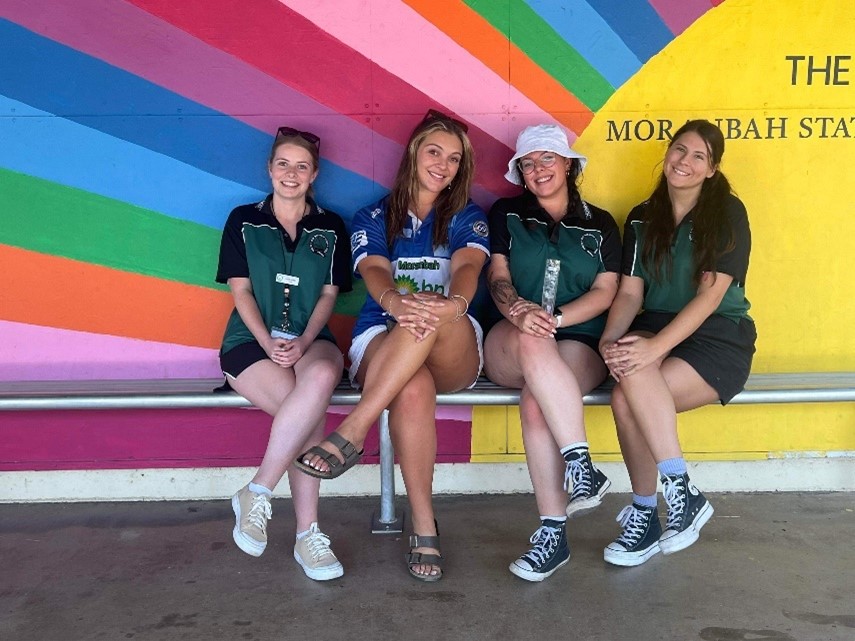
Denby and Raquel will both return to their respective schools for their final practical experience this year.
Past recipient Blaire Thompson taught in Innisfail, Far North Queensland, an experience that she says was unique.
“I find country kids are more open to forming positive relationships with their teachers, and in doing so we build a sense of community, which has probably been the best part.”
"I never thought I'd be so passionate about it, but coming up here has definitely opened my eyes to how impactful teaching can be, especially for rural students.”
Fellow past recipient Maxine Kirby’s first remote placement occurred in Dysart, near Mackay, where she taught for four years before transferring to Gindie, near Emerald. Here, she had the opportunity to step into a leadership role, serving as the school’s principal from 2019-2020.
Maxine received a Tim Fairfax Family Foundation bursary while in her final year of university, and says it made a “huge difference.”
“It gives people who have that curiosity the push to give it a go.”
Read more about Blaire and Maxine’s experiences here.


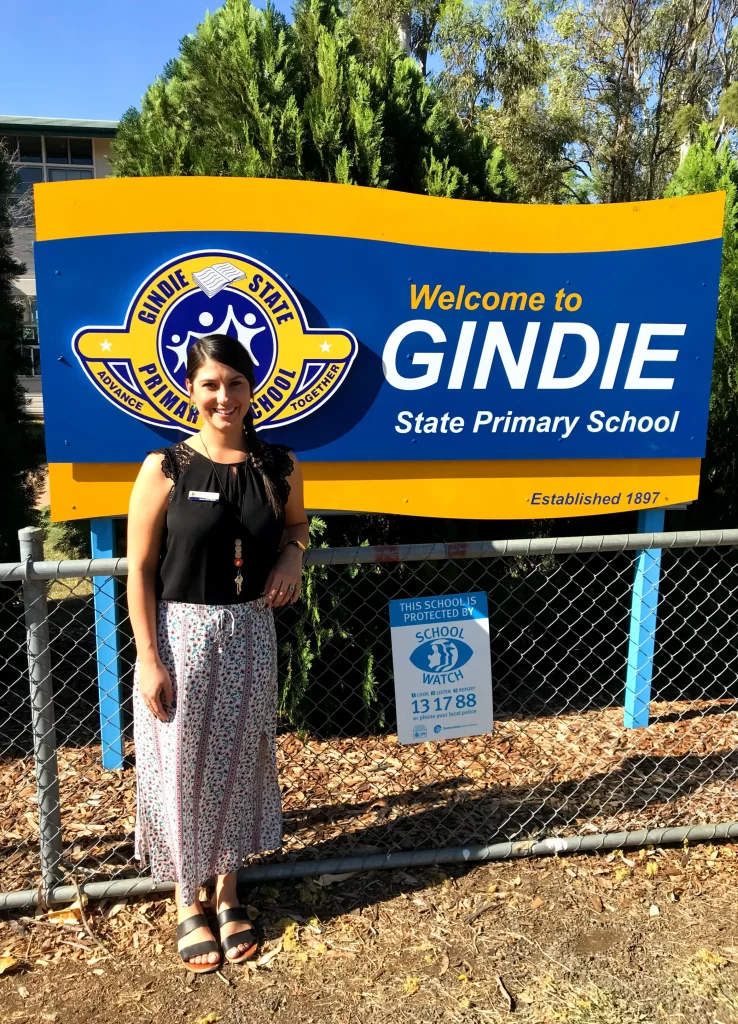
Cover photo courtesy of Marie Dunn. All photos courtesy of the University of the Sunshine Coast.
The University of the Sunshine Coast's School of Education and Tertiary Access is supported through the Leadership stream.
Eastern Arrernte Country
Ltyentye Apurte Catholic School (LACS) is one of the most successful remote Aboriginal schools in central Australia and the NT. It is the only school serving the 600-strong community of Ltyentye Apurte (pronounced ‘L-Ginga Porter’, meaning ‘clump of beefwood trees’ in the Arrernte language) or Santa Teresa. A number of the facilities at LACS are communal, notably the library and computers. The community is 83 km south east of Alice Springs in semi-desert country. Temperatures are extreme, ranging from -1 to 45 degrees but there is year-round access via an unsealed road.
The local Arrernte people are bilingual and speak Eastern Arrernte and English (which is often their second or third language). The Arrernte language and cultural program is a key part of the curriculum at LACS.
In Santa Teresa, extreme socio-economic disadvantage is the norm, with residents and the school facing many challenges, notably extremely poor housing and health, high unemployment with minimal employment opportunities, adults suffering from poor mental health and a high number of students suffering from intergenerational trauma. Remote schools in general have a major issue with teacher retention due to the complex challenges of students and their families. The average stay of a teacher in NT schools is 7 months; 9 months in catholic schools. Existing senior staff frequently work 80 hour weeks, regularly wearing multiple hats in part due to a lack of teachers.
According to the Principal at the time, the future of Santa Teresa depends to a great extent on the school providing the optimal best education for Santa Teresa youth: “To make the remote community of Santa Teresa strong, we must make its school strong.”
In 2022, there were 126 students enrolled, from Pre-School to Year 11. All students are Indigenous and bilingual. Most of the teachers at LACS are non-Indigenous and come with a range of experience from mainstream education. The school is also a major employer of the local Arrernte people, with approximately 60% of Indigenous staff filling a multitude of critical support roles. Teachers work as members of a team in partnership with local Indigenous people and Arrernte assistant teachers and tutors.
Isolation and the challenges of living and working in a community context mean that staff need all the support they can get in terms of building resilience. Ongoing change is the norm, with 2020 and 2021 seeing even higher levels of change and uncertainty. There is often a significant turnover of new staff, which presents additional challenges to building trust and a resilient community.
The impacts of these factors are substantial, including very high levels of stress, distraction from the mission of educating students, lower engagement, uncertainty about the future, change fatigue, staff burnout, talent loss and lower trust in leaders.
To try to address this, the Principal at the time knew they needed to help teachers and staff build resilience, sustainable high performance and change agility. They used a $10,000 grant from FRRR, through the Strengthening Rural Communities program, funded by the Tim Fairfax Family Foundation, to run the Resilient Educators Program (REP).
The REP began with all teachers completing a Resilience Diagnostic, prior to a two-day workshop. The Diagnostic measured individual resilience in areas such as emotional regulation, self-confidence, compassion, exercise, sleep and nutrition. Staff then participated in a two-day workshop, facilitated by Paul Salmon, called “Thriving Through Change and Challenge”. Each staff member created three goals to help improve their resilience and the option of having an accountability buddy or sessions with a resilience coach to support them in reaching their goals.
After the workshop, the teachers were given access to an app, which provided a detailed resilience report and materials to develop new skills. They also committed to participating in a range of activities in smaller groups and with the whole staff community, such as an evening walking group, weekend trips away and a regular BBQ breakfast. This was followed up with a visit from the Resilience coach, which led to three shared goals being created.
Despite challenges in rolling this out due to the pandemic and its subsequent impacts, staff collaborated to implement wellbeing activities based on their learnings from the workshops and the ongoing use of the Resilience App. They continue to come together as a community to support one another in challenging times.
The outcome has been an improvement on the health and wellbeing of the whole community.
“All staff became more aware of the importance of resilience and the necessity to plan for how to manage stress and cope with the added burden of the pandemic. There is also a greater understanding by leadership of the necessity to prioritise staff wellbeing through strategic planning using an integrated holistic approach,” said Pamela Brown, Acting Principal.
“It has become part of our school culture for staff to check in with each other on how they are travelling, especially concerning sleep, exercise and levels of stress. It is now becoming part of our meetings to start with a partner check in or short meditation activity. We introduced a new wellbeing curriculum program, MindUp for Life, which not only teaches the knowledge and skills children need to regulate their stress and emotion but also supports teachers in building positive relationships with students and the broader community."
“There is a more holistic focus on wellbeing and resilience with an area created in the staffroom where staff relax and do mindful colouring. Plus, there are opportunities for staff to publicly acknowledge and show gratitude for effort, and pampering products for staff in our rest rooms.”
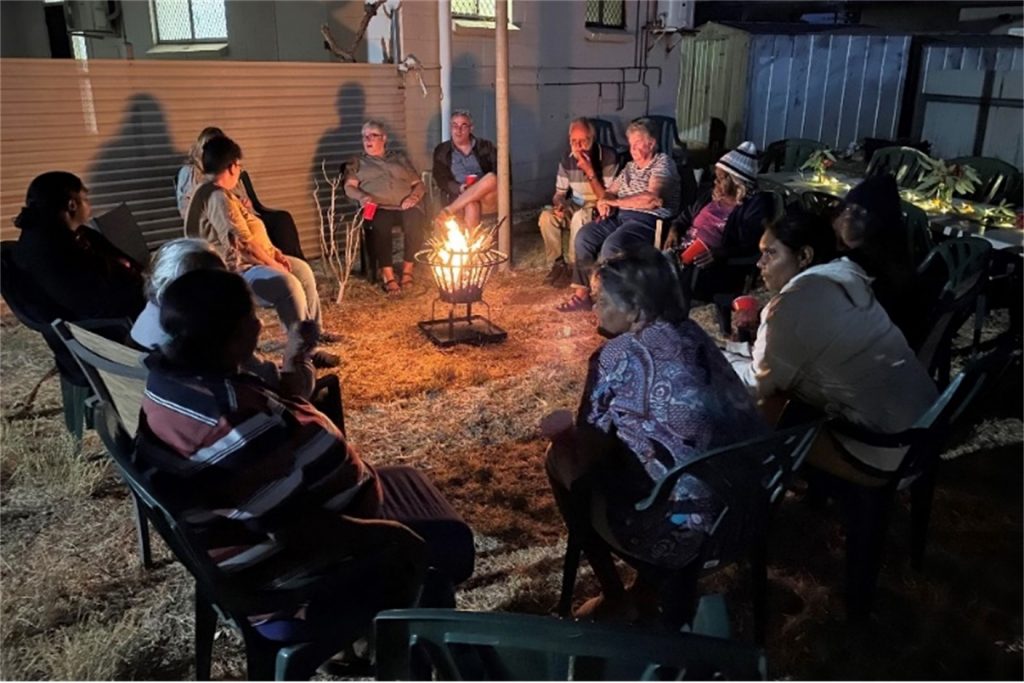
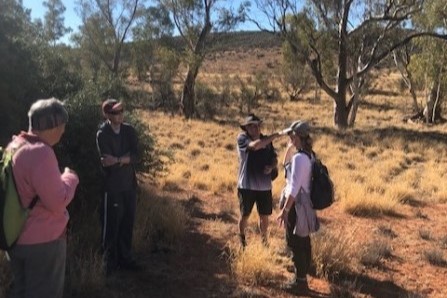
Staff participating in the Resilient Educators Program.
Cover photo: Ltyentye Apurte Catholic School.
All photos courtesy of FRRR and Ltyentye Apurte Catholic School.
Originally written and published by FRRR on 10 November 2022.
The TFFF thanks Ltyentye Apurte Catholic School for providing permission to reproduce this story.
Ltyentye Apurte Catholic School is supported through the Connectedness stream in partnership with FRRR.
artisan provides a platform for emerging and established practitioners alike to showcase their talents, experiment with new techniques, and push the boundaries of traditional craft and design. As a service organisation it offers an incredibly varied range of programs and initiatives, both to the artists it supports and to the public. Featuring a variety of mediums, from ceramics and textiles to jewellery and furniture, artisan’s exhibitions and workshops not only celebrate the skill and craftsmanship of the artists involved but also encourage dialogue and engagement within the broader community.
In 2018, artisan moved to a purpose-built premises on King Street in Bowen Hills, Meanjin (Brisbane) which serves as a hub for exhibitions, workshops, masterclasses, and retail (in-person and online stores) providing a platform to showcase the excellence and diversity of Queensland, Australian, and international craft and design. Here, co-directors Cassandra Lehman and Simone Linssen coordinate innovative ways for the public to engage with craft and design.
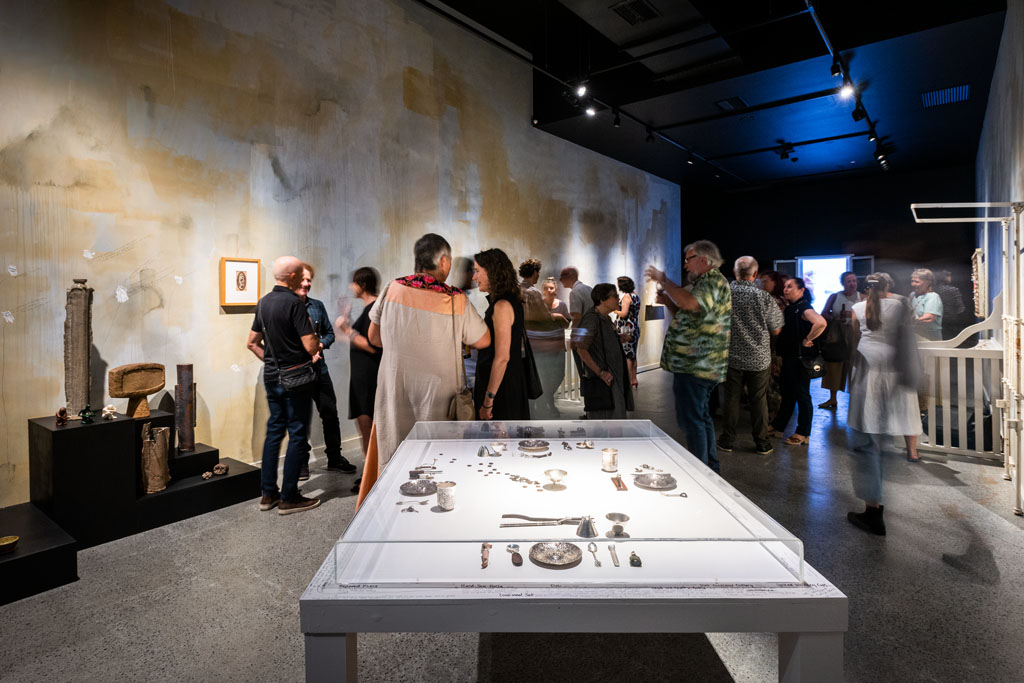
As a small organisation supporting a diverse and widespread sector, artisan collaborates with individual artists and organisations across Queensland to ensure regional areas of the state see equal inclusion and representation. artisan's major biennial exhibition project, Unleashed, explores the convergence between art and design and platforms the work of emerging regional artists. Unleashed provides an opportunity for emerging artists to showcase their work, make new connections, and acts as a launching point for their future careers.
In addition to facilitating Brisbane based residencies for regional practitioners, artisan provides regional residency programs and further exhibition opportunities for Queensland artists outside metropolitan areas through partnerships with Cooroy Butter Factory Art Centre, Canberra Glassworks, and The Jam Factory.
artisan's partnership with sponsor Wonderkarma has paved the way for a series of exhibitions to tour regional Queensland in 2024, fostering stronger ties with regional artists and audiences. This partnership has also conceived the Find | Keep | Make program, a 2-year ongoing professional development project offering opportunities and support to emerging curators and practitioners. Through the program, students are mentored to develop skills and gain professional experience in exhibiting curated and original objects.
To celebrate its first exhibitions of 2024, artisan is holding a free opening night event at the Bowen Hills premises on Friday, 23 February. Daniel Agdag's The Public Office features intricate cardboard models and a mesmerising stop-motion video; Glen Skien's Object Poems delves into the human condition; Jessica Nothdurft's Silly Girl presents small bronzes; and Jean Bennett's Touched explores textiles, sculpture, and mixed media.
In addition to attending exhibitions, artisan provides many exciting and innovative ways for the public to participate in craft and design and support artists – to suit every taste, design aesthetic, or level of experience. Online and in-person workshops, available to book on artisan’s website, offer instruction in paper art, textiles, clothing, embroidery, and working with clay, wood, and metal.
For those who may be less interested in creating their own works, artisan’s physical and online store is well stocked with an incredible range of jewellery, accessories, sculpture, and homewares.
As a not-for-profit organisation, artisan relies on the support of its community and philanthropic partners to continue its work in shaping the future of Queensland’s craft and design sector.
artisan is a new TFFF partner and is supported through the Resilience stream, which provides multi-year general operational support funding. The TFFF recognises the value of providing support to strengthen artisan’s operational capacity and aims to empower artisan, and organisations like it, to focus on its strategic objectives and effectively realise its goals.


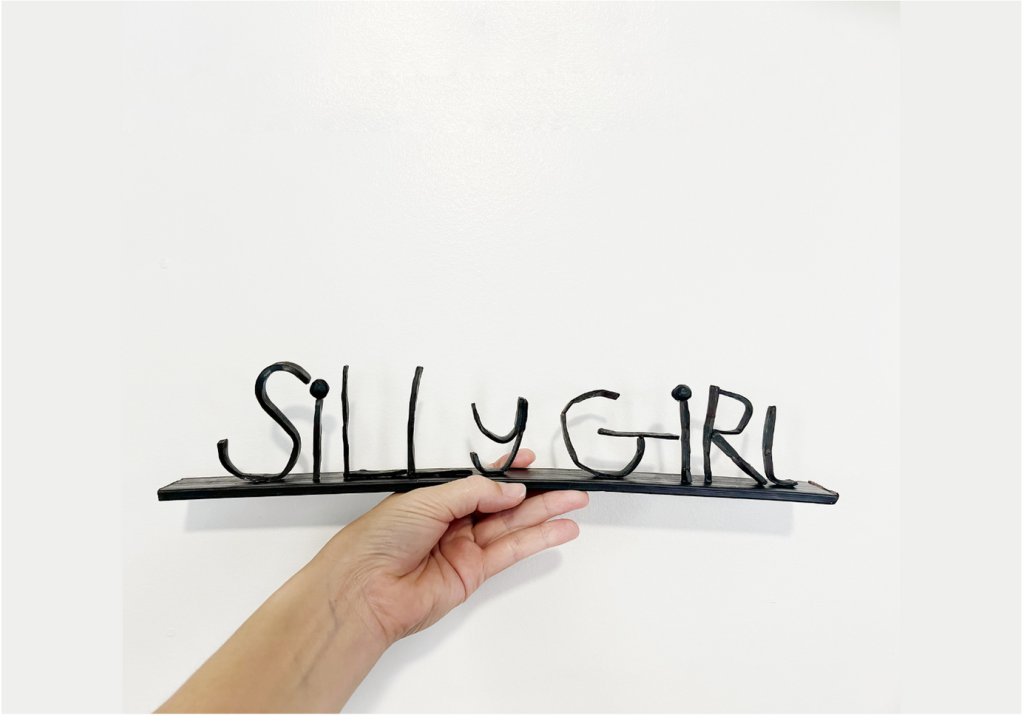
Cover photo: artisan store front, King Street gallery and store launch, 2018. All photos courtesy of artisan.
artisan is supported through the Resilience stream.

